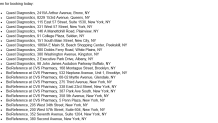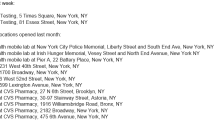What to Know
- President Joe Biden says he has a plan to have all U.S. adults vaccine-eligible by May 1; a "supercharge" is coming to NY, which lifts its domestic travel quarantine rule on 4/1, Gov. Andrew Cuomo said
- Cuomo signed legislation Friday granting public and private employees up to four hours of paid time off per injection to support the vaccination effort
- The accelerated vaccination rollout combined with sustained declines in virus rates have fueled a spate of significant reopenings across the tri-state area; next week will end on a big note
Gov. Andrew Cuomo signed legislation Friday authorizing four hours of paid time off per vaccine injection for all New York's public and private employees. He also expanded the state's rapid COVID testing program ahead of next week's reopenings for wedding receptions and catering events as well as the looming return of smaller entertainment venues.
The rapid testing approach was key to the return of large stadium-sized venues late last month and will be a core component of the state's effort to contain viral spread as it charges forward on its data-driven reopening path, Cuomo has said.
Twenty-six new rapid testing sites will open within the next week for a total of 38 sites statewide, according to the governor. Testing is required for attendance at wedding receptions as well as sporting and entertainment events; the state is piloting a COVID passport of sorts that will make the process even easier. Under the Excelsior Pass program, people can download an app that venues can scan to determine their vaccination and/or COVID testing status. It's totally confidential.
Right now, that program is only being piloted at Barclays Center and Madison Square Garden, though it may have wider application sooner rather than later. Only individuals who aren't experiencing COVID symptoms and haven't had recent known exposure to an infected person can participate in the initiative. Find out how to book an appointment here and see new and existing site details below.

Get Tri-state area news delivered to your inbox. Sign up for NBC New York's News Headlines newsletter.

The governor's announcement Friday comes on the heels of criticism he faces from New York City Mayor Bill de Blasio for one he made a day earlier -- lifting the state's domestic travel quarantine requirement on April 1. De Blasio called that "reckless" and said the state should reconsider for the sake of public health.
News
The mayor, who has publicly blasted Cuomo frequently as of late over sexual harassment allegations and separate bullying claims, amped up the criticism he first unleashed at the governor over the rule change Thursday. Under the new policy, domestic travelers to New York will still be encouraged to quarantine but not required to do so; isolation remains mandatory for international travelers.
Cuomo had mentioned the looming change earlier this month but said at the time that the quarantine requirement would lift for domestic travelers who were fully vaccinated. That, de Blasio said Friday, would have made sense.
"I don't know if that's an April Fools' joke, but it's absolutely the wrong thing to do. It's reckless. It doesn't help us with our recovery," the mayor said. "If you say someone is vaccinated they can fly, they can visit, of course, but if someone's not vaccinated, what's so hard about following the same process that's been followed to date? That is what our healthcare leaders believe makes sense."
"Go through the normal testing process. If you need to quarantine, you need to quarantine. That's what keeps us all safe. Let's keep making progress, let's not undermine it," de Blasio added. "We were all surprised, in fact shocked, when we heard this. It makes no sense to relax such a fundamental standard when we're still fighting this war and have the variants on top of it."
The mayor's top health officials backed him up Friday, for the second day in a row.
"We just have to look around the world and around the country to see that cases do continue to be a problem in other jurisdictions as well. There are major COVID-19 outbreaks occurring in parts of Europe, in parts of South America; there are greater proportions of certain variants in other parts of the United States," the city's health commissioner, Dr. Dave Chokshi, said. "This has been a critical tool in our fight, and now is just the time for us to be redoubling our efforts when the idea we could turn the corner on the pandemic is finally in our sight."
That message about recommitting to COVID prevention efforts in New York has reverberated across America, with the head of the CDC saying the U.S. is in a precarious position the next two months as it looks to get more of the population fully vaccinated. As of Friday, 13 percent of Americans had completed the series.
Cuomo didn't address the mayor's comments in a conference call Friday. He opened by lauding President Joe Biden's plan to make all adult Americans eligible for a COVID-19 vaccine by May 1, which de Blasio did earlier in the day, but noted the plan would have "major ramifications" on state capacity.
The president "moved up dramatically the amount of available vaccines. That means we have to have a tremendous increase in our capacity to vaccinate -- and that is a logistical undertaking unlike anything we have done before," Cuomo said. "We're going to be preparing for that."
The Biden administration also approved dentists, EMTs, midwives, optometrists, paramedics, physician assistants, podiatrists, respiratory therapists and veterinarians to administer doses as it looks to exponentially boost the rollout. Cuomo's planning likely involves changes to authorized personnel as a result.
Biden's plan would have 15 million New Yorkers eligible for vaccination by May 1, up from the 12 million-plus eligible now and a momentous increase from the 4 million-plus who have received at least one dose statewide so far. The state needs the capacity to address that increase as quickly as possible, though Cuomo admitted it won't be as simple as everyone getting vaccinated on May 1.
Not sure how the process works? Check out our handy tri-state vaccine site finder and FAQs here
New York City and New Jersey Vaccine Providers
Click on each provider to find more information on scheduling appointments for the COVID-19 Vaccine.
Data: City of New York, State of New Jersey • Nina Lin / NBC
He didn't elaborate on what types of capacity changes would be needed for the state's already sprawling distribution network to administer shots more quickly to a growing number of people, but indicated more details would come soon.
Later Friday, he announced the signing of the paid time off for vaccination bill. That law, which affords up to four hours per shot for every public and private employee in New York, takes effect immediately, Cuomo said.
"Our essential employees have been on the front lines of this pandemic since day one, and as we begin to work toward a new normal in a post-pandemic world, it is critical that these employees are able to get vaccinated as quickly as possible to protect themselves and their families," the governor said. "This legislation will allow both public and private employees to take time off to get vaccinated without exhausting the leave they have earned, putting us one step closer to getting every single New Yorker vaccinated and defeating this virus once and for all."
A new federal effort targeting the state's hardest-to-reach people will also help achieve the president's goal at the local level. More than 100 new vaccine sites will be established at federally-funded community health centers in the coming weeks, Sen. Majority Leader Chuck Schumer said Thursday.
The federal government will provide specially allocated doses on top of the state's weekly allocation, which it also did under the partnership that bore the state's largest mass vaccine sites to date in Brooklyn and Queens, directly to the centers.
Another boon for the rollout -- CVS Health announced Thursday it would add another 37 locations to the nearly four dozen already vaccinating people across New York state starting Sunday. That'll bring its total number of New York vaccine sites to 81, the company said. Appointments will open up for booking Saturday.
More than 12 million New Yorkers are already eligible for vaccination, including the latest group (anyone 60 and older) made eligible Wednesday. Next week, more people -- social service and child service caseworkers, sanitation and DMV workers, county clerks, building service and election workers and public works employees and government inspectors join the ever-widening pool
As of Friday, New York state had administered at least one dose to more than 4 million people, which reflects only a third of the number currently eligible (and indicates the length of the line) and about 21 percent of the state's population. More than 2.1 million people, 10.7 percent of the populace, are fully vaccinated.
In New York City, 1.5 million people (18.5 percent of the population) have gotten at least one dose, while nearly 740,000 (8.8 percent of the population) have both.
Across the river, New Jersey has doubled-dosed more than 947,000 people, about 10.6 percent of its population. It took the state roughly 55 days to hit the first million doses, but just three weeks to move from that benchmark to the 2 million- milestone. About 10 percent of Connecticut's population is also fully vaccinated.
Daily Percentage of Positive Tests by New York Region
Gov. Andrew Cuomo breaks the state into 10 regions for testing purposes and tracks positivity rates to identify potential hotspots. Here's the latest tracking data by region and for the five boroughs. For the latest county-level results statewide, click here
Source: ny.gov
Vaccines are expected to work on the coronavirus variants that have emerged and those that will over time. The more people who are vaccinated, the less the virus can spread and the less opportunity it has to mutate into a potentially more transmissible or otherwise dangerous form, health experts say.
It's a critical race -- one far more akin to a marathon than a sprint. Cuomo says the low threshold for herd immunity is about 75 percent. New York, and the nation, have a long way to go.
In the meantime, officials urge their residents to continue using the same core precautions that stemmed the spread of earlier strains: Wear a mask (two are better), socially distance, wash your hands and stay home when you're sick.



